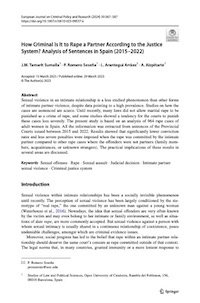By J.M. Tamarit Sumalla, P. Romero Seseña, L. Arantegui Arràez, A. Aizpitarte
Sexual violence in an intimate relationship is a less studied phenomenon than other forms of intimate partner violence, despite data pointing to a high prevalence. Studies on how the cases are sentenced are scarce. Until recently, many laws did not allow marital rape to be punished as a crime of rape, and some studies showed a tendency for the courts to punish these cases less severely. The present study is based on an analysis of 964 rape cases of adult women in Spain. All the information was extracted from sentences of the Provincial Courts issued between 2015 and 2022. Results showed that significantly lower conviction rates and less severe penalties were imposed when the rape was committed by the intimate partner compared to other rape cases where the offenders were not partners (family members, acquaintances, or unknown strangers). The practical implications of these results in several areas are discussed.
European Journal on Criminal Policy and Research, Volume 30, pages 567–587,



